Rosemary Oil For Hair Growth – How To Use It And Side Effects
This golden elixir is a must-have in your hair care routine as a shampoo or conditioner.
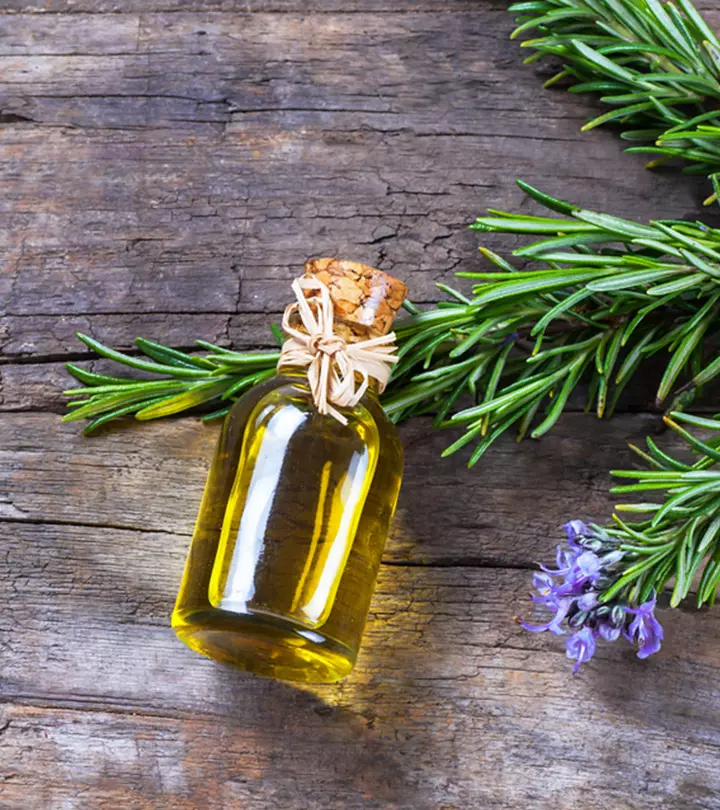
Image: ShutterStock
Using rosemary for hair growth offers additional benefits to hair and improves its texture. This oil is native to the Mediterranean region and promotes hair growth and scalp health. Rosemary oil is widely used in medicines and food. This article discusses the scientific merit behind the hair benefits of rosemary, how rosemary oil can help your hair, and how to use it correctly to reap the maximum benefits it offers. Scroll down to read more.
 Know Your Ingredient: Rosemary
Know Your Ingredient: RosemaryWhat Is It?
A pale yellow aromatic essential oil extracted from the leaves of the rosemary plant.
What Are Its Benefits?
It maintains scalp health by alleviating dandruff and irritation, boosts blood circulation, and cleanses hair follicles, thus supporting healthy hair growth.
Who Can Use It?
Rosemary oil is suitable for all hair types.
How Often?
It can be used 1-3 times weekly.
Caution
Pregnant and lactating women and those with hypertension and essential oil allergy should avoid using rosemary oil.
In This Article
Can Rosemary Oil Treat Hair Loss?
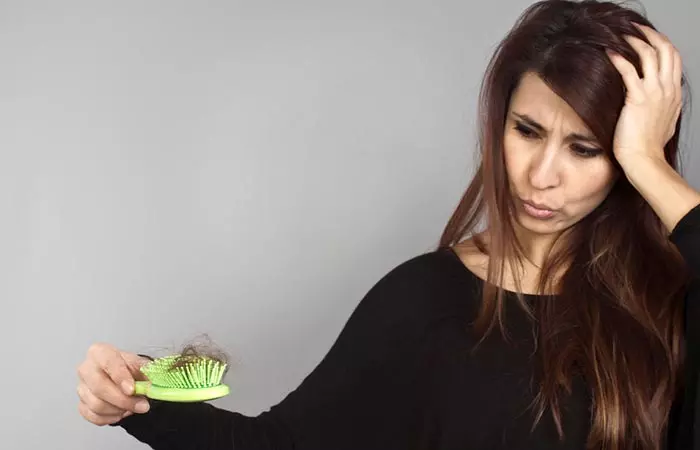
Most of the hair-boosting rosemary essential oil benefits are based on anecdotal evidence. Claims do show that the oil may treat hair loss. Rosemary oil benefits for hair include:
- Rosemary oil helps stimulate blood circulation to the scalp. This, in turn, can promote hair growth.
- Rosemary oil has anti-inflammatory and analgesici A type of medication that relieves physical pain and discomfort without making the person unconscious. properties (1), (2). These may help soothe the scalp.
- Rosemary oil exhibits antifungal properties against Malassezia furfur, fungi that cause dandruff (3).
- The oil from the herb may cleanse the hair folliclesi Sacs in which sebaceous (oil) glands open and lead to hair growth, damage to which can lead to hair loss or reduce hair growth. and scalp. This could reduce the risk of dandruff and hair fall.
- The oil may also repair hair damage.
More research is warranted to understand the beneficial effects of rosemary oil on hair. However, some studies that were conducted did show favorable results.
Rosemary Oil For Hair – What Research Says
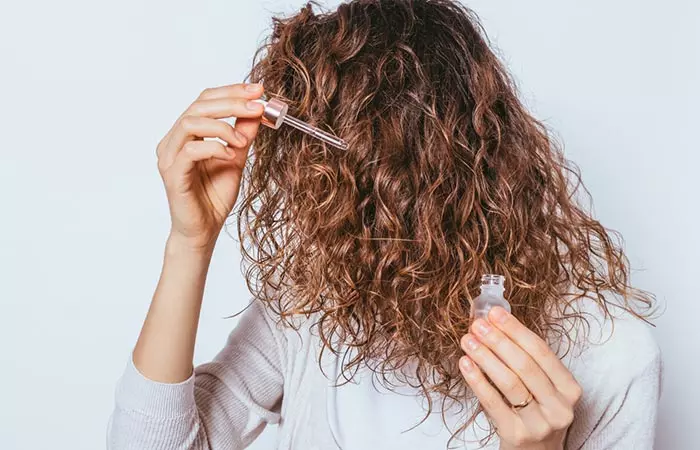
Rosemary is generally hailed as a great herb for hair growth. A study found that the oil extracted from rosemary could help in treating androgenetic alopeciai Permanent hair loss from the scalp common in both men and women that usually results in baldness. . The study compared the effects of rosemary oil to minoxidil, a medication used for hair loss. The results showed that rosemary oil was as effective as 2% minoxidil in controlling hair loss (4).
 Quick Tip
Quick TipIn another study, topical application of rosemary extract could stimulate hair growth in mice (5). In this case, the hair loss was initially induced by testosterone treatment.
Aromatherapy with rosemary oil (and other essential oils) was also found to improve alopecia areata in patients (6). The patients who massaged the essential oil mixture (including rosemary oil) into their scalp daily showed better hair regrowth.
Check out the next section to learn how you can prepare rosemary oil for hair growth at home.
How To Make Rosemary Oil For Hair
Give your hair a natural boost with homemade rosemary oil! Here’s a simple guide:
What You Need
- Dry rosemary sprigs
- A carrier oil (like olive oil or coconut oil)
- A glass jar with a tight lid
- A storage container
What To Do
- Chop the rosemary sprigs finely and place them in a clean, dry glass jar.
- Heat the carrier oil until it is warm, then pour it over the rosemary sprigs.
- Seal the jar tightly and let the mixture steep for a few hours or overnight.
- Strain the oil to remove the rosemary sprigs and transfer it into another clean container.
- Store this oil in a dark, cool place.
Ella, a lifestyle blogger, shared how she prepared rosemary oil for personal use without adopting the heating method. She writes on her blog, “I poured some olive oil in an empty container, put the dried rosemary in it, then sealed the container (i).” Ella adds, “I didn’t use heat to infuse it so I wouldn’t destroy the properties of the oil.” She then kept the container in a dark corner for three weeks.
So, if you’re looking for a natural remedy to improve the health of your hair, you might want to consider using rosemary leaves for hair care. Using rosemary oil for hair growth is simple. In the following section, we have listed a couple of recipes that can help you if you are unsure of how to use rosemary oil for hair growth.
How To Use Rosemary Oil For Hair Growth
1. Rosemary Hot Oil Treatment

Hot oil treatment can be a great way to deep condition your hair. The process is efficient and requires minimal ingredients. The treatment can also help tackle dry, damaged hair while improving scalp health.
You Will Need
- 2 to 4 drops of rosemary essential oil
- 2 tablespoons of carrier oil (coconut, olive, or almond oils)
- Hot towel or shower cap
- Shampoo
- Conditioner
What You Have To Do
- Mix the rosemary oil and the carrier oil of your choice. Heat the mixture until it is warm. Ensure you do not heat the oils in a microwave oven (to avoid nutrient loss).
- Section your hair and massage the oil into your scalp for about 10 minutes.
- Work the oil along the length of your hair until the roots and tips are well covered.
- Wrap a hot towel (use a blow dryer to heat your towel) around your oiled hair. Alternatively, you can cover it with a shower cap.
- Keep the towel wrapped around your head for about 30 minutes before washing the oil out. The warm environment will allow maximum penetration and absorption of nutrients.
- Rinse the oils out of your hair with your regular shampoo. If you have oily hair, you can skip conditioning.
- End the wash with a cool water rinse to seal your cuticles.
How Often You Should Do This
You can treat your hair to a hot oil treatment up to 2 times a week.
Note: Do not overheat the oil as it may burn your scalp. Overheating the oil may also reduce its nutrients. You may use this recipe even if your hair is greasy.
 Quick Tip
Quick Tip2. Rosemary Leave-in Conditioner
Rosemary promotes hair growth in ways similar to minoxidil, a medication for hair growth (4). Using it as a leave-in conditioner may leave the hair feeling glossy and soft. It may also treat itchy or dandruff-ridden scalp.
You Will Need
- 1 tablespoon of rosemary leaves/15 drops of rosemary essential oil
- 1 cup of water
- Tea infuser
- Spray bottle
What You Have To Do
- Measure a cup of water and boil it.
- Add about 15 drops of rosemary essential oil to the boiled water. Alternatively, you can steep the dried rosemary leaves in the boiled water using a tea infuser for 10 minutes.
- The essential oil and water mixture will carry no color, while the steeped rosemary tea will be pale green.
- Pour the mixture into a spray bottle.
- Wash your hair and spray it with the rosemary-infused water while your hair is still damp. Ensure that you cover most of your hair and scalp.
- Let your hair air dry.
How Often You Should Do This
You can use this leave-in treatment every time you wash your hair or in between washes to freshen your hair.
Note: Use this treatment with caution if you have high blood pressure or are pregnant. Anecdotal evidence suggests that rosemary oil may have adverse effects on pregnant women or those with high blood pressure levels. However, direct research is lacking in this aspect.
3. Rosemary Water (Rosemary Hair Rinse)

Rosemary hair rinse may make your hair shiny and manageable. It may stimulate the scalp and prevent hair loss.
You Will Need
- 1 tablespoon of dried rosemary leaves
- 1 cup of water
What You Have To Do
- Boil the water and add the rosemary leaves to it.
- Let the mixture boil for 15 minutes.
- Strain the liquid and set it aside to cool.
- Wash and condition your hair as usual and then pour the rosemary-infused water through your hair as a final rinse.
- Massage your scalp for a couple of minutes after pouring the rinse through your hair.
How Often You Should Do This
Use this rinse once a week.
Note: Ensure the rosemary water has completely cooled before you pour it through your hair. Water too hot can open up the cuticles and lead to moisture loss.
4. Rosemary Shampoo
Using rosemary as shampoo may promote hair growth.
You Will Need
- A rosemary shampoo bar
- 1 tablespoon of dried rosemary
- 3 cups of water
What You Have To Do
- Grate the shampoo bar and add it to a saucepan with the water and dried rosemary.
- Heat the shampoo water on a low setting until the shampoo bar has completely dissolved.
- Let the mixture cool. Transfer it into a shampoo dispenser.
- Use it as your regular shampoo.
How Often You Should Do This
Use this shampoo no more than 3 times a week.
Note: Use the shampoo for longer than a week to allow your hair to get adapted to it. Your hair may look greasier in the first week.
5. Rosemary Vinegar
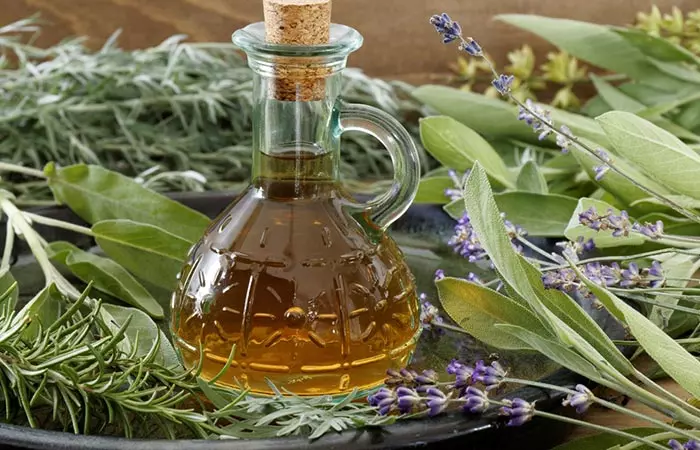
Hair growth could sometimes slow down due to the build-up of dirt or product residue. This build-up may clog your follicles and form deposits on your hair shaft. Using a rosemary vinegar rinse can help solve this issue.
You Will Need
- 1 cup of apple cider vinegar
- 3 to 4 sprigs of fresh rosemary
- 2 cups of water
What You Have To Do
- Crush the sprigs of fresh rosemary and soak them in the apple cider vinegar. Store in a cool and dark place for about 4 weeks.
- After 4 weeks, mix 4 tablespoons of this rosemary vinegar with 2 cups of water.
- Use this mixture as a final rinse after you shampoo and condition your hair.
How Often You Should Do This
Use this rinse once a month in addition to other rosemary treatments.
Note: Do not use the rosemary vinegar in excess. This is especially important if you have dry hair. An excess of the vinegar can dehydrate your hair.
Rosemary oil seems to benefit hair in a number of ways. However, the oil comes with its own set of adverse effects. While these effects are only based on anecdotal evidence, they must still be considered.
Side Effects Of Rosemary Oil For Hair
- Avoid getting rosemary essential oil into your eyes. If contact does happen, rinse your eyes immediately with cold water. The oil may cause eye irritation in some.
- Applying too much rosemary oil to your scalp may cause irritation. Using a carrier oil along with rosemary oil may help prevent this.
- No study particularly states that rosemary oil is safe for pregnant or breastfeeding women. Hence, avoid the oil altogether. The same applies to individuals with high blood pressure levels.
How Long Does Rosemary Oil Take To Boost Hair Growth
The effects of rosemary oil on hair growth may be seen in a month. Regular use of the oil may boost hair growth rate and hair volume. Remember not to switch between too many ingredients. Everyone’s hair is different. Hence, use in your treatments the ingredients that suit you the best (and those you are not allergic to).
Infographic: DIY Rosemary Oil Recipes For Hair Growth
Rosemary essential oil has recently been a popular ingredient in hair care products for preventing hair loss. Many people swear by the efficiency of home remedies with this potent oil. If you are looking for some quick recipes using rosemary oil, check out the infographic below. Illustration: StyleCraze Design Team
Rosemary oil is commonly used in traditional medicines and DIY natural remedies. It is one of the best natural oils to treat hair issues. You may use rosemary oil for hair growth and improve scalp health. Rosemary oil benefits your hair by stimulating the hair follicles, treating dandruff issues, soothing the scalp, and reducing hair loss. It may not directly impact hair health. However, it can be combined with other therapies. Most of the hair care benefits of rosemary oil are based on anecdotal evidence. Therefore, you may use the oil and observe the changes over a period. However, consult a doctor if you experience any side effects.
Frequently Asked Questions
Can I spray rosemary oil on my hair every day?
Yes, you can spray rosemary oil on your hair every day. Once you notice hair growth or the desired improvement in hair health, you can reduce that to every alternate day or once or twice a week.
Does rosemary thicken hair?
Rosemary may stimulate hair growth, promote hair strengthening, keep your scalp free from fungal infections, and reduce hair fall. It stimulates blood flow to the scalp and has anti-inflammatory properties to soothe it. All the properties improve your overall hair health, which promotes hair thickening and makes your hair more beautiful.
Does rosemary darken your hair?
Anecdotal evidence suggests that herbal remedies containing rosemary can darken hair. However, you may not see substantial results. Instead, it improves overall hair health, which may impact hair’s appearance and grow darker. Mix rosemary with hair-darkening ingredients like henna or tea to make hair darker.
How long can you store rosemary oil for hair?
You can store rosemary oil in an airtight bottle or container for 5-6 months.
Key Takeaways
- Rosemary oil exhibits antifungal properties against fungi that cause dandruff.
- Rosemary rinse can make your hair shiny and manageable.
- However, excess use of rosemary oil may irritate your scalp.
Illustration: Rosemary Oil For Hair Growth – How To Use It And Side Effects
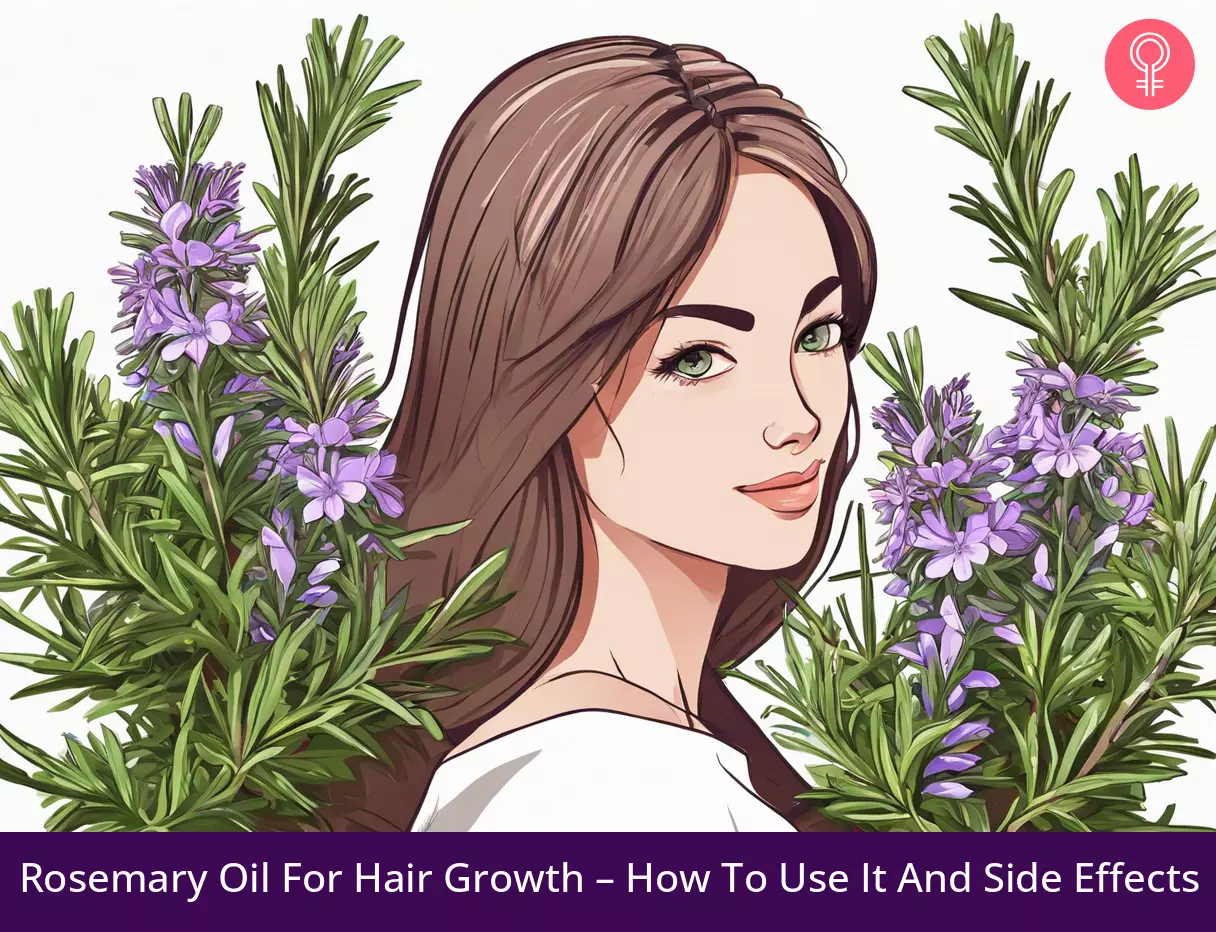
Image: Stable Diffusion/StyleCraze Design Team
Discover the power of rosemary for your hair! Whether you are seeking hair growth, combatting hair loss, or tackling gray hair, this video provides natural remedies and tips for healthier locks.
Personal Experience: Source
StyleCraze's articles are interwoven with authentic personal narratives that provide depth and resonance to our content. Below are the sources of the personal accounts referenced in this article.
i. How I made my rosemary oil and benefits
https://ellainlagos.wordpress.com/2015/11/05/how-i-made-my-rosemary-oil-and-benefits/
References
Articles on StyleCraze are backed by verified information from peer-reviewed and academic research papers, reputed organizations, research institutions, and medical associations to ensure accuracy and relevance. Read our editorial policy to learn more.
- Anti-inflammatory and antinociceptive effects of Rosmarinus officinalis L. essential oil in experimental animal models
https://pubmed.ncbi.nlm.nih.gov/19053868/ - Analgesic effects of rosemary essential oil and its interactions with codeine and paracetamol in mice
https://www.researchgate.net/profile/Nebojsa_Pavlovic/publication/271591611_Analgesic_effects_of_rosemary_essential_oil_and_its_interactions_with_codeine_and_paracetamol_in_mice/links/54cf4a3f0cf298d6566324dd/Analgesic-effects-of-rosemary-essential-oil-and-its-interactions-with-codeine-and-paracetamol-in-mice.pdf - To study the antidandruff activity of rosemary oil, basil oil, coleus oil over selenium sulfide
https://www.semanticscholar.org/paper/To-study-the-antidandruff-activity-of-rosemary-oil%2C-Patil-Gadekar/70242df2ea04bc5af510e6181e38d888b196101e?p2df - Rosemary oil vs minoxidil 2% for the treatment of androgenetic alopecia: a randomized comparative trial
https://pubmed.ncbi.nlm.nih.gov/25842469// - Promotion of hair growth by Rosmarinus officinalis leaf extract
https://pubmed.ncbi.nlm.nih.gov/22517595// - Randomized Trial of AromatherapySuccessful Treatment for Alopecia Areata
https://jamanetwork.com/journals/jamadermatology/fullarticle/189618
Read full bio of Dr. Shruti Chavan
Read full bio of Anjali Sayee
Read full bio of Eshna Das
Read full bio of Swathi E






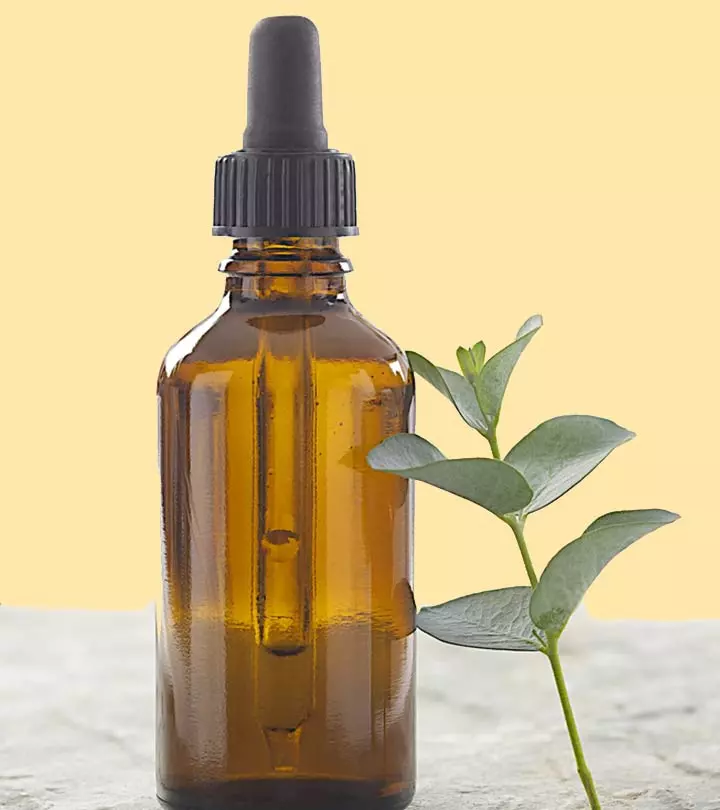
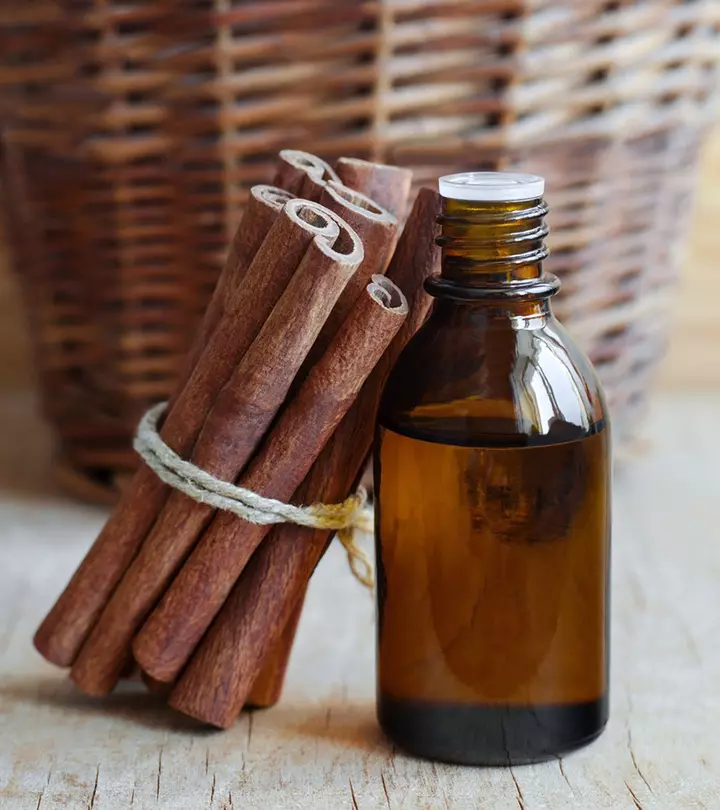
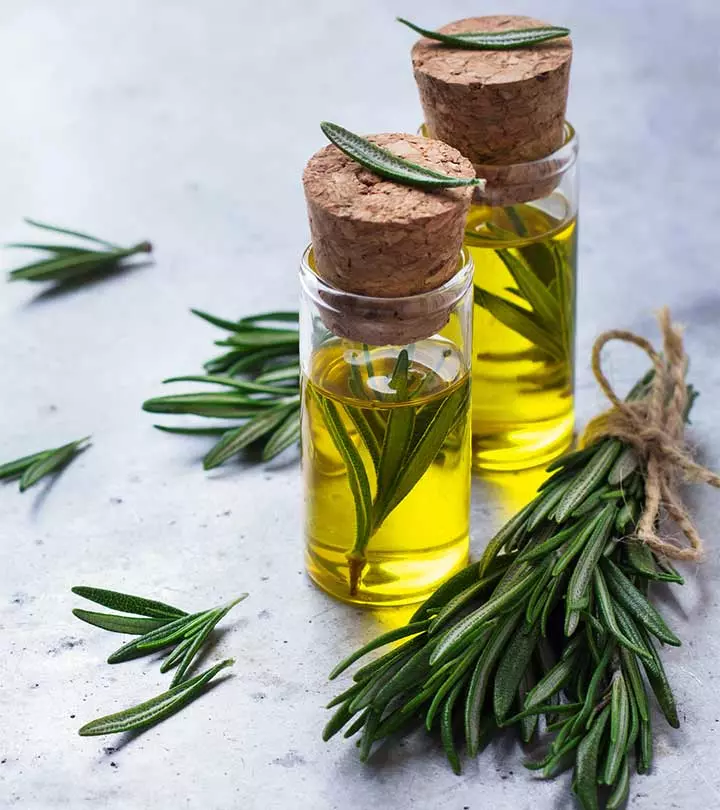

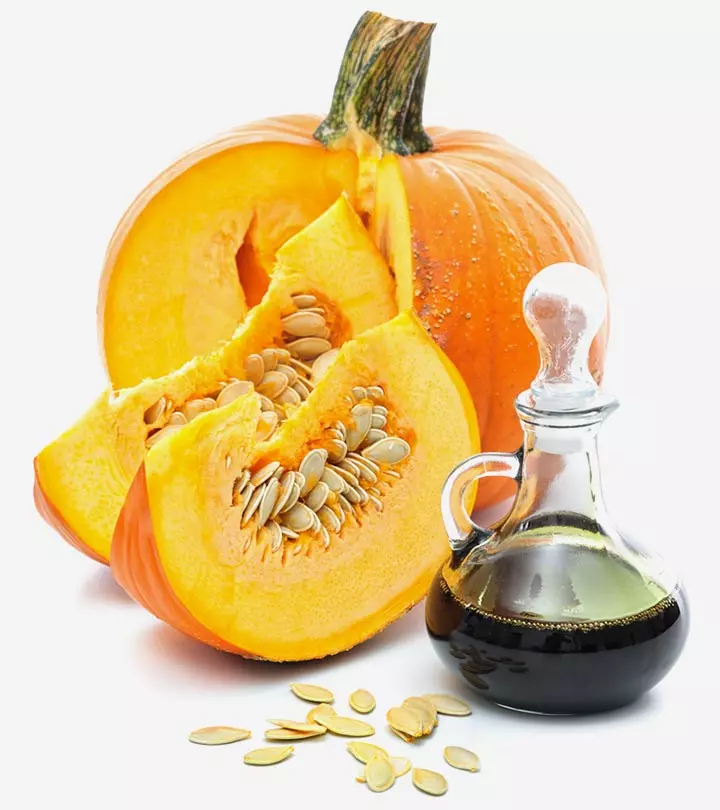
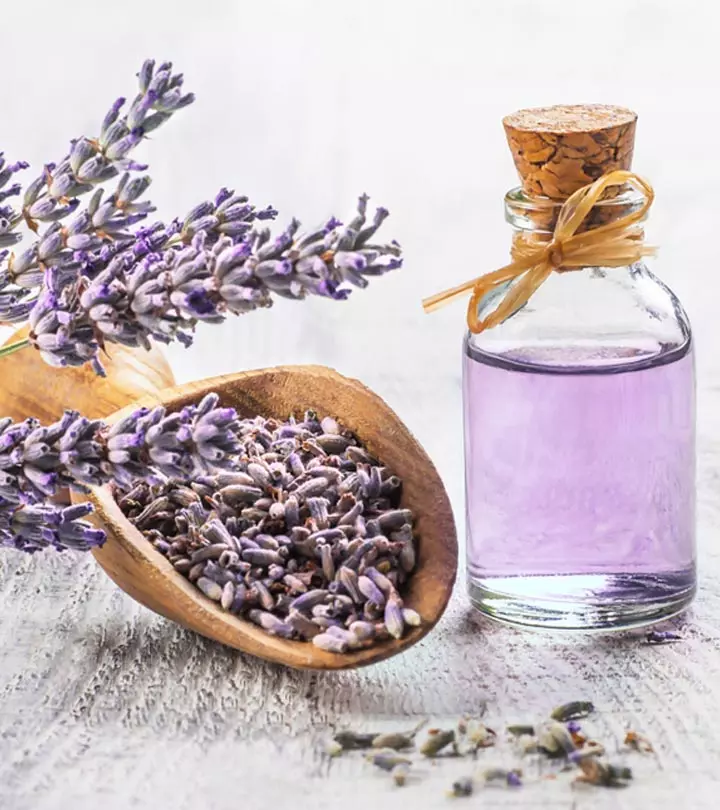
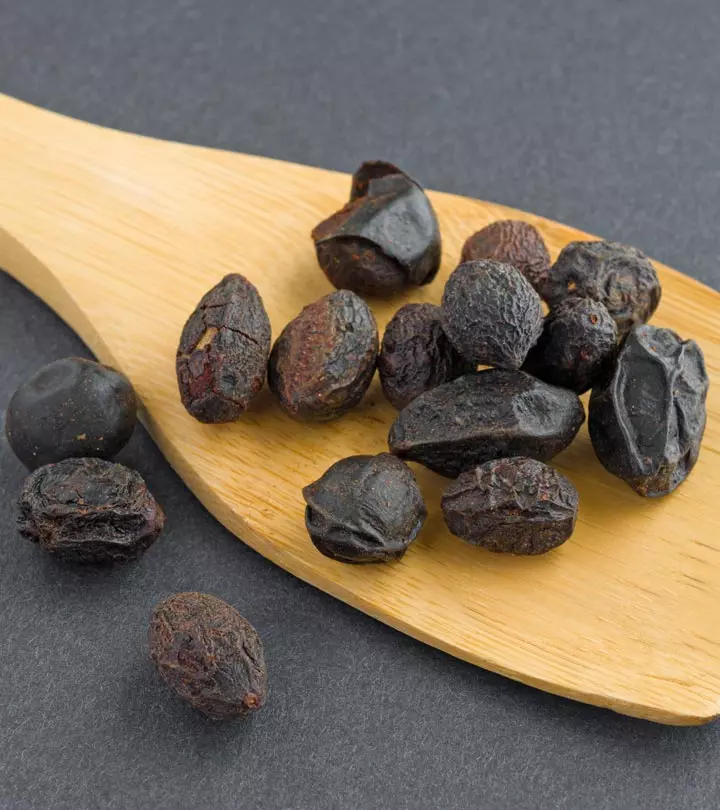

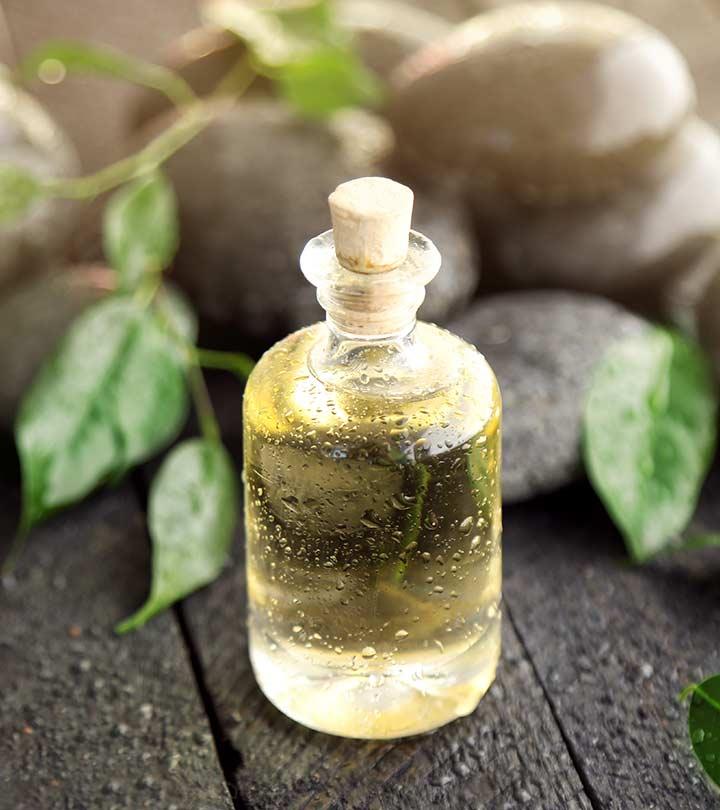

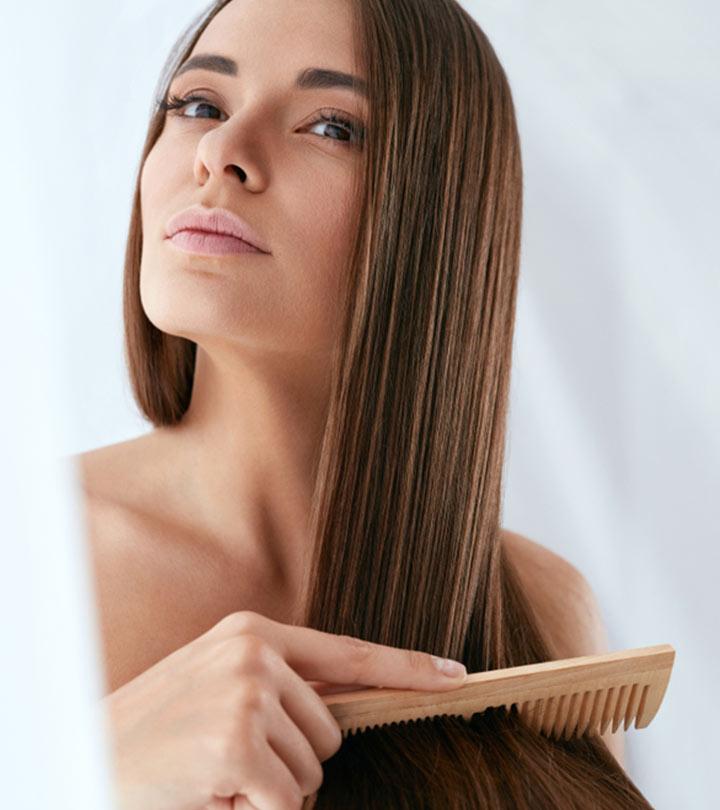


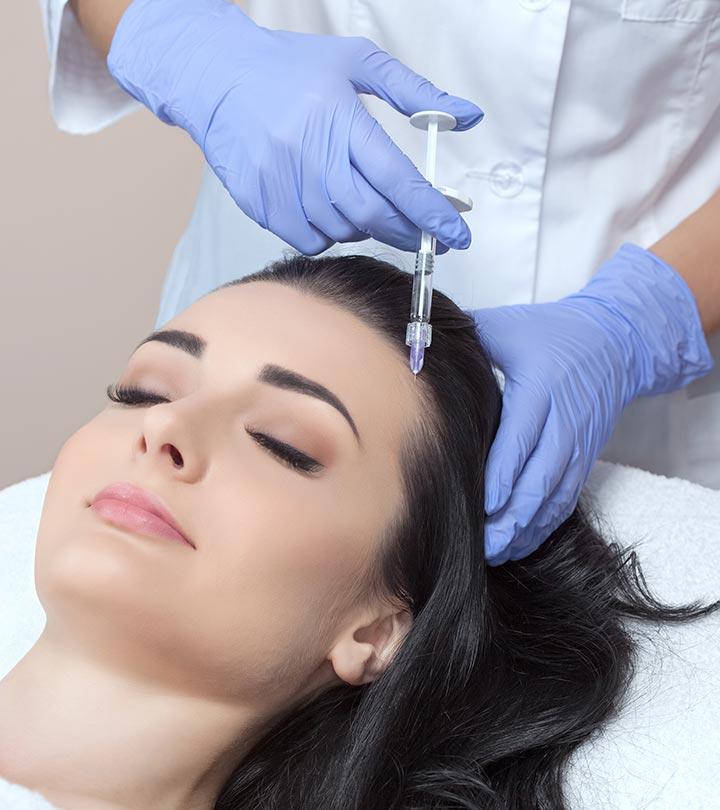



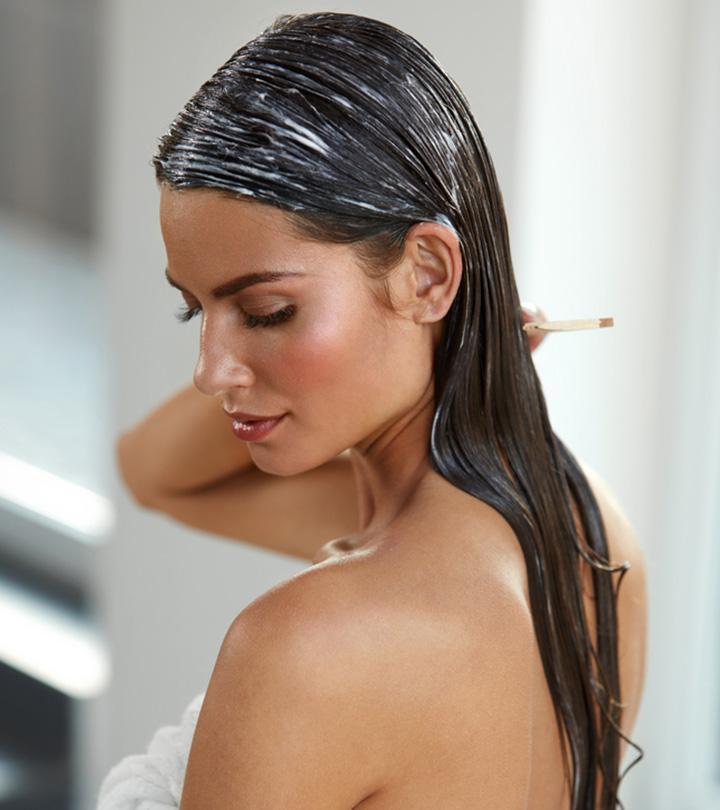


Community Experiences
Join the conversation and become a part of our empowering community! Share your stories, experiences, and insights to connect with other beauty, lifestyle, and health enthusiasts.